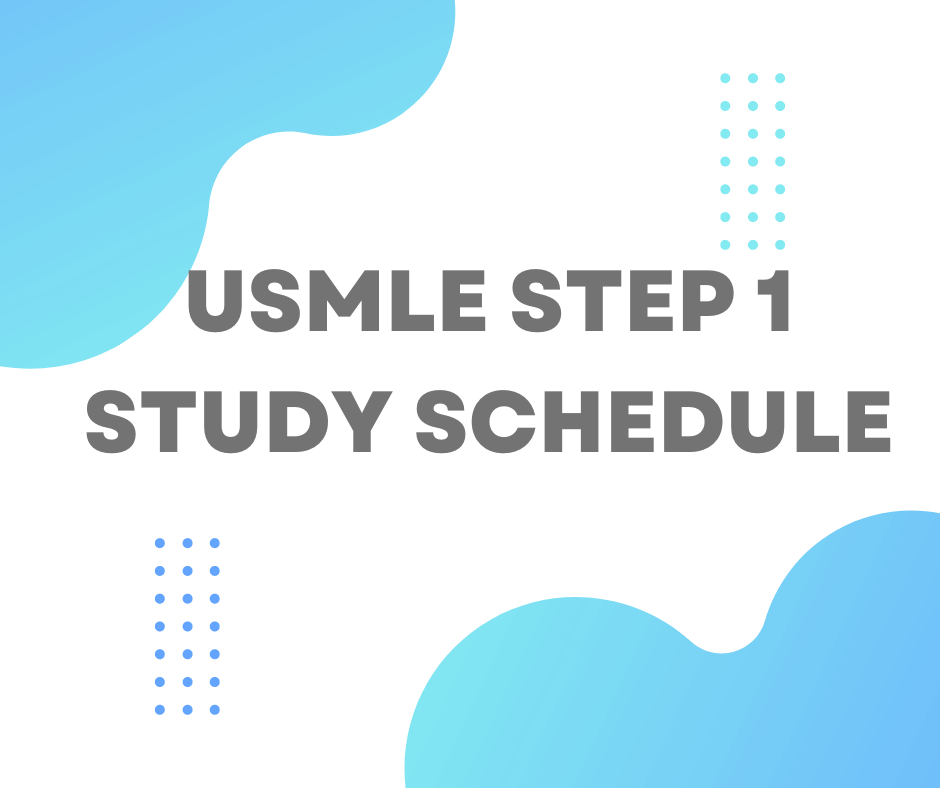

Are you prepared to take the USMLE Step 1? It can be an intimidating challenge but can be overcome with suitable preparation and a viable study program. You must create an effective USMLE Step 1 study schedule that works best for you.
In this guide, we’ll teach you how you can effectively create a study plan that would help you successfully pass the hurdles of taking the USMLE Step 1. Are you excited? Let’s get started.
Establish Your Goals

Passing the USMLE exam is not an easy feat. The time of the examination itself is already daunting. How much more is the exam itself?
It does not imply that there is no way, though. You can overcome the challenges and top the exam. What do you need? A suitable study plan.
And how would you do it?
The first thing you should do to create an effective USMLE Step 1 study schedule is to establish your goals.
By first establishing your goals, you will be able to set realistic expectations to ace the USMLE Step 1. Recognizing your aptitudes and inadequacies can help you set achievable objectives for yourself.
Take some time to assess the amount of effort you can devote each day or week towards studying, as well as areas that require further attention. Establish a timeline for completing the material. It will also be beneficial when it comes to staying focused on your goal of passing the exam.
Additionally, try setting daily mini-goals such as reading 10 pages from a textbook every morning before class starts or answering 15 multiple-choice questions after dinner each night. These small accomplishments add up over time, leading toward success on test day.
Setting goals is the foundation for creating an effective USMLE Step 1 study plan. You can construct a successful USMLE Step 1 blueprint by prioritizing your time and taking advantage of the available materials.
Choose Your Study Materials Well
Pick out the assets that are most advantageous for your situation once you’ve set achievable objectives for yourself.
There are many different types of materials available online and in print that can help prepare students for the USMLE Step 1 exam, including:
- Textbooks
- Practice questions
- Flashcards
- Lectures
Choose resources based on what works best for you. If lecture-style videos help you better understand concepts, use those instead of textbooks.
Additionally, don’t forget to seek additional guidance from mentors or peers who have successfully taken the exam. They may provide helpful tips or advice on how to deal with topics or tricky questions during the test day.
Create a Schedule
Time management is the key to studying for the USMLE Step 1. How to do this? Create a schedule to maximize your efficiency and ensure you cover all the materials.
Most importantly, create a study plan that suits your needs to ensure success.
Create an effective USMLE Step 1 study schedule by breaking down your goals into manageable chunks so that they don’t seem too overwhelming all at once. Divide the four chapters into smaller sections, such as one per week, to make them seem more achievable.
Prioritize Your Time Wisely
When creating a study plan, consider how much time each task requires and prioritize accordingly.
For example, if there’s a topic or concept that takes longer to understand than others, dedicate more time to mastering it rather than spending equal amounts of time on every subject.
Allot extra time for practice questions and tests. It will help gauge your progress throughout your studies.
Make Time for Breaks and Self-Care
It can be tempting to cram in much information as possible in one setting. However, this can lead to burnout quickly, so it’s important not to overwork yourself.
Take regular breaks throughout the day. Take at least five minutes. In this way, you don’t get overwhelmed by all the material at once. During these breaks, do something unrelated, such as going outside or doing light exercise. By doing so, you give your brain a break from studying while still keeping up with physical activity.
Utilize Technology To Stay On Track
Utilizing technology such as scheduling apps or calendar reminders can help you track what needs to be done daily. These tools help you save time and energy without writing everything on paper manually.
Apps like My Study Life also provide features such as color-coding tasks according to their importance level. It will make it easier to spot all the tasks on your list and help you stay organized during crunch times.
Utilize Effective Study Strategies
Understanding the material and utilizing active recall techniques are keys when it comes to creating an effective USMLE Step 1 study schedule.
Developing a comprehensive understanding of the material is essential for success on the exam.
To do this:
Read through all relevant course materials thoroughly and use diagrams or charts to visualize concepts better.
You can also practice active recall techniques to commit information to memory, like using flashcards or writing summaries of what you have learned.
Incorporating mnemonics can also be helpful when studying for USMLE Step 1. Mnemonics are tools that help us remember complex pieces of information by associating them with something more memorable, like a phrase or acronym.
For example, “Every Good Boy Does Fine” is often used as a mnemonic device to remember musical notes in order: EGBDF (from the lowest line or space on the staff).
Visualization techniques can also be beneficial when preparing for USMLE Step 1. Try picturing how different systems interact together in your mind’s eye as you review topics like anatomy and physiology.
You can ensure a better performance on the USMLE Step 1 by utilizing effective study strategies. You can also ask any top USMLE tutors for assistance in developing effective strategies to ace the exam.
Take Practice Tests Regularly
Taking practice tests regularly is an essential part of creating an effective USMLE Step 1 study schedule. It’s important to familiarize yourself with the test format and content so that you know what to expect on exam day.
Identifying your strengths and weaknesses on a practice test will help you determine which topics need more attention during preparation.
After completing the practice test, analyze the results thoroughly. Pay special attention to any questions that were missed or answered incorrectly, and make sure to review those topics in greater detail before taking the actual exam.
It’s also beneficial to take multiple practice tests throughout your study period, as this will help you to be accustomed to how long it takes you to complete certain sections of the exam and how best to manage your time when answering questions.
Additionally, taking additional practice tests gives you valuable insight into which areas require further review before sitting for the real thing.
When studying for USMLE Step 1, it’s easy to become overwhelmed by all the material covered on the exam, but don’t forget why you are doing this—because knowledge is power.
Most importantly, make sure to choose the right USMLE Step 1 prep course that best fits your learning style and background.
Varsity Tutors User choice
Stay Motivated and Positive
Creating an effective USMLE Step 1 study schedule is no easy feat. Staying focused and motivated throughout the study process is essential for achieving your USMLE Step 1 goals.
Celebrating small victories along the way can help keep you motivated during the long journey ahead. Take time to appreciate what you have accomplished so far. It can give you the boost you need to continue striving for success. Even if it’s just one chapter or mastering a difficult concept.
Find support from friends, family, or peers. They can be incredibly helpful in keeping you motivated throughout your study process. Their presence can have a tremendous impact on helping you maintain an upbeat attitude and conquer any impediments that may come up during your studies.
Rewarding yourself after reaching certain milestones is another great way to stay motivated while studying for your USMLE Step 1 exam.
Treat yourself to a dinner out with friends or simply take time off from studying after a tough section. It will give you something to look forward to, as well as, much-needed rest before jumping back into more studying.
Conclusion
The step to creating a study plan that would help you eventually pass the USMLE Step 1 is by creating a realistic schedule for reviewing and studying. You have to prioritize your time so that you can allot sufficient time to it.
What’s more, if you try to cram all your sessions along, cramming will likely end up hurting you in different ways. Not only will it make it harder to learn and remember the basics, but you may also be done with your study plan before even your test date.
Do yourself a favor and create an effective USMLE Step 1 study schedule!
FAQs
Start by defining what you can achieve in a given period. Then structure it into achievable pieces and take stock of your advancement regularly. Devise a timeline that slices these objectives into more compact tasks that can be accomplished in reasonable subtasks over weeks or months. Finally, build in regular review periods to stay on track with your progress and make any necessary adjustments.
It is difficult to definitively answer how many hours a day one should study for USMLE Step 1. Each person’s study approach varies depending on individual abilities, deficiencies, and inclinations. It is recommended that individuals aiming for higher scores spend at least 6–8 hours per day in dedicated study time.
Creating an effective study schedule requires planning and discipline. Figure out the time you can give to studying each day or week, then break it down into reasonable amounts for every subject. Set realistic goals and objectives for yourself, making sure they are achievable within the allotted timeframe.
It is difficult to give a definitive answer on how many hours a week you should study for USMLE Step 1. It depends on the individual’s learning style, existing knowledge base, and goals. Generally, individuals should allocate roughly 10-12 hours a week to their Step 1 studies to reach an average score or better.
Although the majority of students take Step 1 of the Boards after their second year, you might want to hold off until you are quite certain you will pass. Ideally, you should take the test by April.





